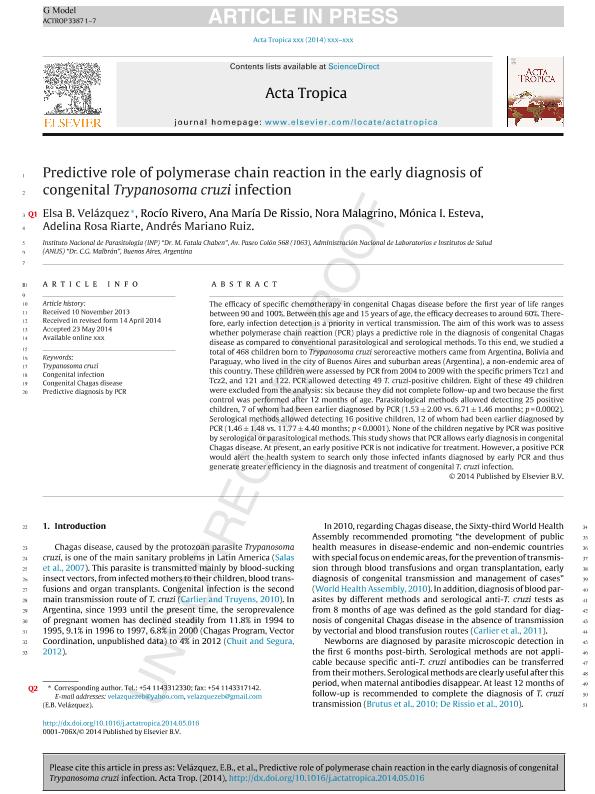Artículo
Predictive role of Polymerase Chain Reaction in the early diagnosis of congenital Trypanosoma cruzi infection
Velázquez, Elsa Beatriz ; Rivero, Rocío
; Rivero, Rocío ; de Rissio, Ana María; Malagrino, Nora; Esteva, Mónica Inés; Riarte, Adelina Rosa; Ruiz, Andres Mariano
; de Rissio, Ana María; Malagrino, Nora; Esteva, Mónica Inés; Riarte, Adelina Rosa; Ruiz, Andres Mariano
 ; Rivero, Rocío
; Rivero, Rocío ; de Rissio, Ana María; Malagrino, Nora; Esteva, Mónica Inés; Riarte, Adelina Rosa; Ruiz, Andres Mariano
; de Rissio, Ana María; Malagrino, Nora; Esteva, Mónica Inés; Riarte, Adelina Rosa; Ruiz, Andres Mariano
Fecha de publicación:
06/2014
Editorial:
Elsevier
Revista:
Acta Tropica
ISSN:
0001-706X
Idioma:
Inglés
Tipo de recurso:
Artículo publicado
Clasificación temática:
Resumen
The efficacy of specific chemotherapy in congenital Chagas disease before the first year of life ranges between 90 and 100%. Between this age and 15 years of age, the efficacy decreases to around 60%. There- fore, early infection detection is a priority in vertical transmission. The aim of this work was to assess whether polymerase chain reaction (PCR) plays a predictive role in the diagnosis of congenital Chagas disease as compared to conventional parasitological and serological methods. To this end, we studied a total of 468 children born to Trypanosoma cruzi seroreactive mothers came from Argentina, Bolivia and Paraguay, who lived in the city of Buenos Aires and suburban areas (Argentina), a non-endemic area of this country. These children were assessed by PCR from 2004 to 2009 with the specific primers Tcz1 and Tcz2, and 121 and 122. PCR allowed detecting 49 T. cruzi-positive children. Eight of these 49 children were excluded from the analysis: six because they did not complete follow-up and two because the first control was performed after 12 months of age. Parasitological methods allowed detecting 25 positive children, 7 of whom had been earlier diagnosed by PCR (1.53 ± 2.00 vs. 6.71 ± 1.46 months; p = 0.0002). Serological methods allowed detecting 16 positive children, 12 of whom had been earlier diagnosed by PCR (1.46 ± 1.48 vs. 11.77 ± 4.40 months; p < 0.0001). None of the children negative by PCR was positive by serological or parasitological methods. This study shows that PCR allows early diagnosis in congenital Chagas disease. At present, an early positive PCR is not indicative for treatment. However, a positive PCR would alert the health system to search only those infected infants diagnosed by early PCR and thus generate greater efficiency in the diagnosis and treatment of congenital T. cruzi infection.
Archivos asociados
Licencia
Identificadores
Colecciones
Articulos(SEDE CENTRAL)
Articulos de SEDE CENTRAL
Articulos de SEDE CENTRAL
Citación
Rivero, Rocío; Esteva, Mónica Inés; de Rissio, Ana María; Ruiz, Andres Mariano; Riarte, Adelina Rosa; Malagrino, Nora; et al.; Predictive role of Polymerase Chain Reaction in the early diagnosis of congenital Trypanosoma cruzi infection; Elsevier; Acta Tropica; 137; 6-2014; 195-200
Compartir
Altmétricas



